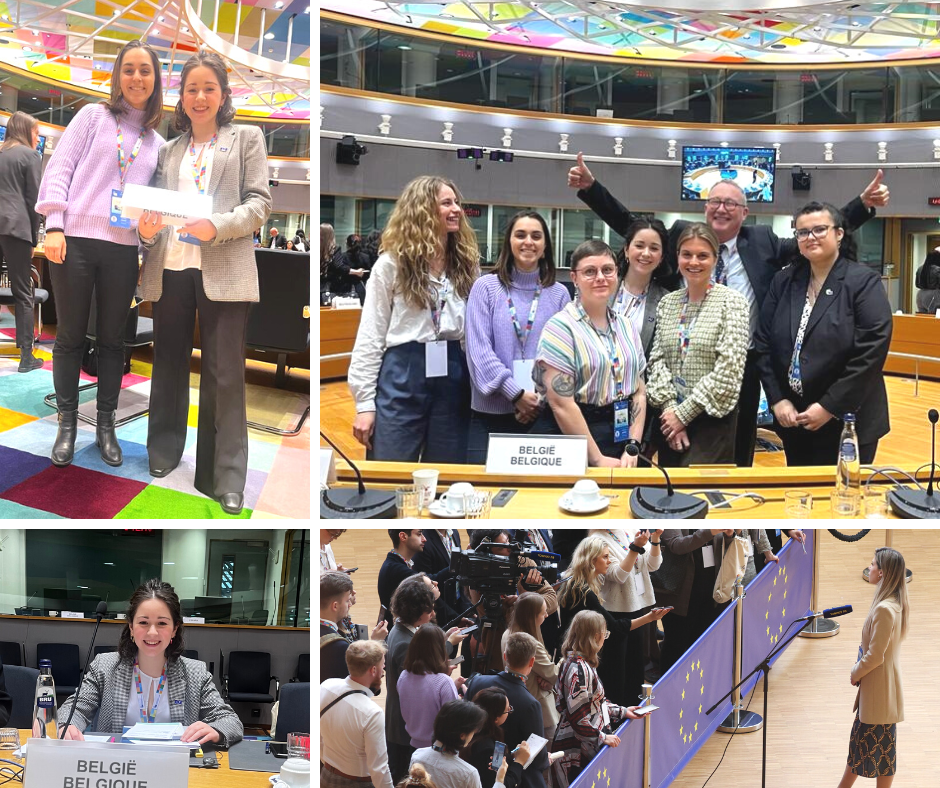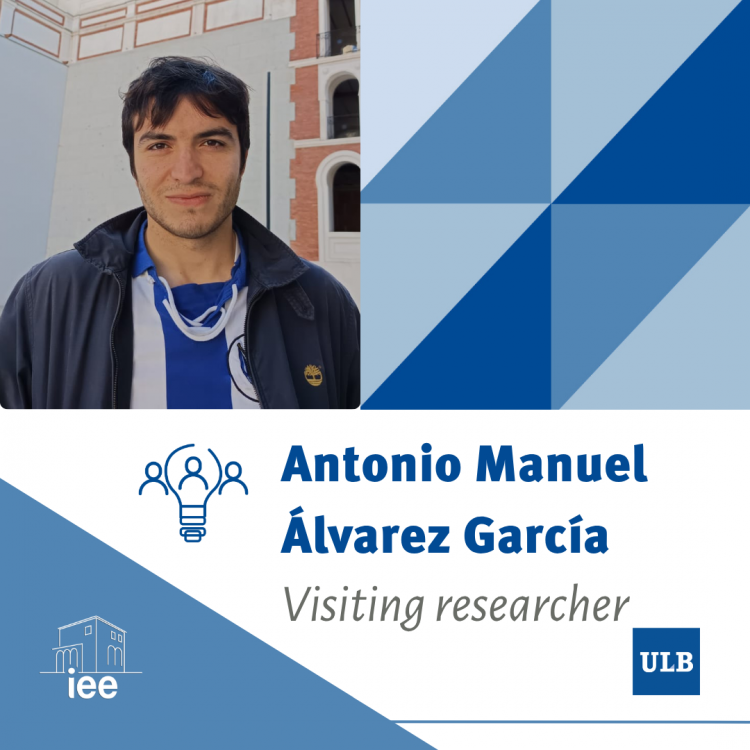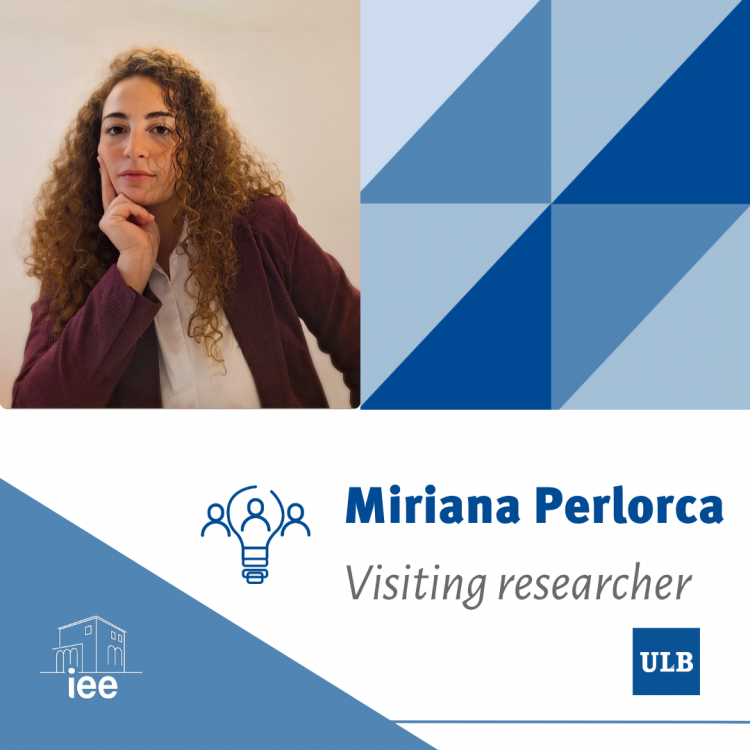The authors, Luisa Gambaro and Paula Notivoli Cabezas are students following the Master’s in European Studies, organized by the Faculty of Philosophy and Social Sciences with the label of the Institut d’études européennes.
Have you ever wanted to attend confidential negotiations between European heads of state? Well, it is now possible with ConSIMium! On the 2 and 3 February, the Council of the European Union in Brussels hosted 27 national delegations made of students from all across Europe. With this first ConSIMium, students could simulate the unfolding of a European Council and Council.
Each delegation included 6 participants, playing the roles of Prime Ministers, Ministers, ambassadors, national experts and journalists. At each negotiating level, students aimed at adopting a common position on two regulations proposals to reduce CO2 emissions in the road transport sector. Just like in real life, the final goal of these two regulations was to achieve carbon neutrality in the European Union by 2050. Two members of the Belgian delegation and Master’s students at the Institute of European Studies, Paula and Luisa, tell us more about their experience.
Paula, the Belgian ambassador negotiating at the COREPR
We started ConSIMium with the European Council (EUCO), i.e. the meeting of Prime Ministers and Presidents. EUCO meetings are always at closed doors and there are no minutes, so everything we were able to know about it was what our Prime Minister briefed us. There were no major negotiations but it was useful for us to know where the other delegations stood and finalise our negotiating points for the working parties. As we had two different dossiers, there were two different working parties: one for transport and one for energy. In each of them we had a national expert. With the working parties the official agenda for the first day came to an end but, as you can imagine, there was still a lot of work to be done. Both experts briefed me and our Minister on the negotiations, the compromises and the potential alliances, we re-worked our positions (golden, silver and bronze; not the red lines) on both proposals and exchanged with delegations with whom we shared positions (even if not fully).
On the second day, the first item on the agenda was COREPER and, therefore, my time to sit at the EUCO room and negotiate. Both proposals were not discussed at the same time and even though it was a closed doors negotiation, during the discussions of each proposal I had the relevant expert behind me for any clarification she would want to make or any help I needed. Compromise was found and we passed onto the Council. Council negotiations are not secret as they are highly political; our Minister was sitting on the table, I was behind her as the experts had been during COREPER, and our experts and Prime Minister were on a separate room following the negotiations.
“It is very unusual for this kind of initiative to come from the institution itself, and even more unusual that they allow us to ‘play’ in their premises and sit in the negotiating table with people whose daily (real) work is this. It is certainly a unique experience and I encourage all EU university students to take part in it.” Paula Notivoli Cabezas
Luisa, the Belgian journalist reporting on closed-door negotiations
During ConSIMium, most of the negotiations are confidential, like at the European Council or COREPER. Hence, the journalists’ role is to seek information kept away from the public. To access the negotiations’ content, the journalists must receive regular updates from their delegation colleagues. The journalists relay such updates through Twitter and can rebalance the negotiations by leaking the unpleasant political attitudes of some Prime Ministers or revealing an agreement a Minister surprisingly consented to make. Thus, journalists can use Twitter to inform public opinion and put pressure on national negotiators rapidly. At the end of the negotiations, journalists write an article for their national media explaining the event they covered.
The ConSIMium began with the arrival of national Heads of State on the red carpet for the European Council. Journalists gathered along the carpet to collect their official statements and ask a few rapid questions. Delivered statements are mostly political and vague, but they might help grasp potential coalitions among the European Council. While the Heads of State are negotiating, journalists wait for any information leak or official declaration from the Council’s spokesperson in the Council’s atrium. At the end of the European Council, journalists attend the press conference held by the President of the European Council and the President of the Commission, explaining the outcomes of the negotiations. All these pieces of information are useful to the journalists to write their articles for their national media by the end of the day.
Want to participate? Find out how!
Paula and Luisa received information about ConSIMium from Professor Amandine Crespy. To be selected for the ConSIMium, the two students sent their CVs and motivation letters to the Council’s team in charge of the organization. In their application dossier, they also brought to the fore their previous experience in negotiation simulations, such as MUNs. They believe that such previous knowledge was determinant for them to be selected.
In Belgium, three students were selected from the French community and the other three from the Flemish community. Paula and Luisa were selected by the Committee of Rectors of the Wallonia-Brussels Federation, and were very lucky as there were cases where only one student per University could be selected.
Once they were selected for the delegation of Belgium, Paula and Luisa received the contact information about the rest of the team: the Prime Minister, the Minister and the two national experts. They quickly met online with their coordinator, Professor Van Thiel, former EU diplomat designated by the Brussels School of Governance to coach the six Belgian delegates during ConSIMium. For two months, the whole team met online to understand each other’s roles, European Council and Council’s functioning, and the position of Belgium on the dossier to negotiate.
“ConSIMium is a very enriching experience for students because it gives us a real insight of the daily negotiations in the one of the most sealed institution. Taking part in ConSIMium is helpful for our theoretical knowledge, but also professional experience.” Luisa Gambaro
A final word: get involved too!
More inforamation on the simulation ConSIMium: a Council simulation experience – Consilium (europa.eu)




